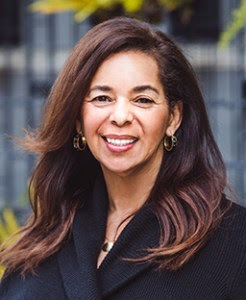By Edward Henderson
Contributing Writer
SACRAMENTO — As California and the federal government invests trillions of dollars in infrastructure projects, advocates say there’s a cost for not guaranteeing equitable racial and ethnic participation in contracting, as firms are hired to carry out the necessary work.
In California, many of the firms owned by Blacks and other minorities qualify as historically underutilized businesses, a U.S. Small Business Administration certification that prioritizes companies in the procurement process.
“Inequity costs everybody,” said Ingrid Merriwether, a member of the Equity Infrastructure Project Advisory Council and CEO of Merriwether & Williams Insurance Services.
Merriwether told California Black Media, “Things cost more because you don’t have enough competition. In public contracting, they award business on the lowest responsive bidder.
“When you have fewer people competing, people are paying more. With tax dollars involved, we are all paying more.”
Merriwether and other advocates are working to ensure more Black-owned and other minority-owned firms gain from California’s upcoming taxpayer-funded infrastructure projects through government contracts.
In California, where more than 99% of all businesses are designated small businesses and 45% are minority-owned, advocates stress the importance of fair contracting according to the California Office of the Small Business Advocate.
Merriwether played a key role in the creation and administration of the Los Angeles Regional Contractor Development and Bonding Program. Her firm has administered successful contractor development programs for the city of Los Angeles, Los Angeles County, the count’s Metropolitan Transportation Authority, Alameda County, and San Francisco City and County — the latter for more than 20 years. These programs have facilitated over $1 billion in bonding for small local contractors and have saved public sponsors over $22 million due to low bids from program participants.
In 2021, President JoeBiden signed a $1.2 trillion Infrastructure Investment and Jobs Act, mandating a minimum of 10% of its funding for surface transportation projects go to “small businesses owned and controlled by socially and economically disadvantaged individuals.”
In May, Gov. Gavin Newsom unveiled proposals to streamline projects, declaring that the state will invest up to $180 billion towards clean infrastructure over the next decade. His office predicts the investment will generate 400,000 quality jobs while helping to achieve the state’s climate goals.
“The only way to achieve California’s world-leading climate goals is to build, build, build faster,” said Newsom, speaking at the site of a future solar farm in Stanislaus County.
“This proposal is the most ambitious effort to cut red tape and streamline regulations in half a century,” the governor added. “It’s time to make the most out of taxpayer dollars and deliver results while creating hundreds of thousands of good jobs.”
Newsom says that California is funding statewide construction projects. Funding will come from previous state budgets and from the federal Infrastructure Investment and Jobs Act and Inflation Reduction Act.
On the local level, organizations are doing their part to increase equity when it comes to diverse firms landing infrastructure contracts. In Los Angeles, the Regional Contractor Development and Bonding Program is actively helping small, local and diverse contractors build their business capacities and access millions of dollars in contracts. The program helps fund surety bonds which can be expensive barriers for smaller firms fighting for contracts, and financing for firms whose cash flow is held up during the long wait for approval to pay workers after completing government jobs.
Critics of government preferences for minority-owned businesses claim that programs raise costs and invite fraud. In 2019, $300 million in federal contracts intended for minority-owned businesses went to business owners with false claims of Native American heritage.
Another concern critics share is that smaller firms have a lower work completion rate. The industry “loss ratio” or number of contractors who do not finish the job is 20% in the United States.
However, with a track record of having less than a 1% surety bond guarantee default rate for program-enrolled contractors, Merriwether envisions being able to facilitate access to contract funding once they’ve been successful in winning contracts with the program’s public agency sponsors.
“We’ve been able to demonstrate that these contractors are also competent,” she said. “If you provide equitable resources, they can compete, they can be low bidders and they successfully complete their contracts compared to their peers.
“We’ve been very fortunate to demonstrate the true potential of these firms,” she added. “What we want to do is amplify what we’ve been doing on a small scale to show folks that this is what we need to be doing on a national scale; using public funding as an appropriate source to change these dynamics and supply chain for small minority business. It’s the right thing to do.”
The Equity Infrastructure Project was formed in April 2022 to leverage infrastructure spending to build wealth in underserved communities. It has persuaded several municipalities, including the California State Transportation Agency to pledge more infrastructure funds to historically underutilized businesses. In October 2022, the Equity Infrastructure Project and five other state-level departments of transportation signed an equity pledge in Washington, D.C.
“Some may say that our work is about infrastructure or contracting, and indeed it is,” said co-founders Phil Washington and John Porcari in a letter on the Equity Infrastructure Project’s status. “Most importantly, however, our mission is about people.
“It’s about creating careers in underserved communities. It’s about creating generational wealth and closing the racial wealth gap to break long-lasting cycles. It’s about people’s economic security and peace of mind.”
“The recommendations are the result of meeting with Californians from all walks of life — elected officials from around the state and heads of major transportation agencies but also community leaders and members,” said former Los Angles Mayor Antonio Villaraigosa in a press release. “Centering community and advancing equity is essential in this work, as is promoting environmental sustainability and expanding economic opportunity for all.”
Edward Henderson is a reporter for California Black Media.











